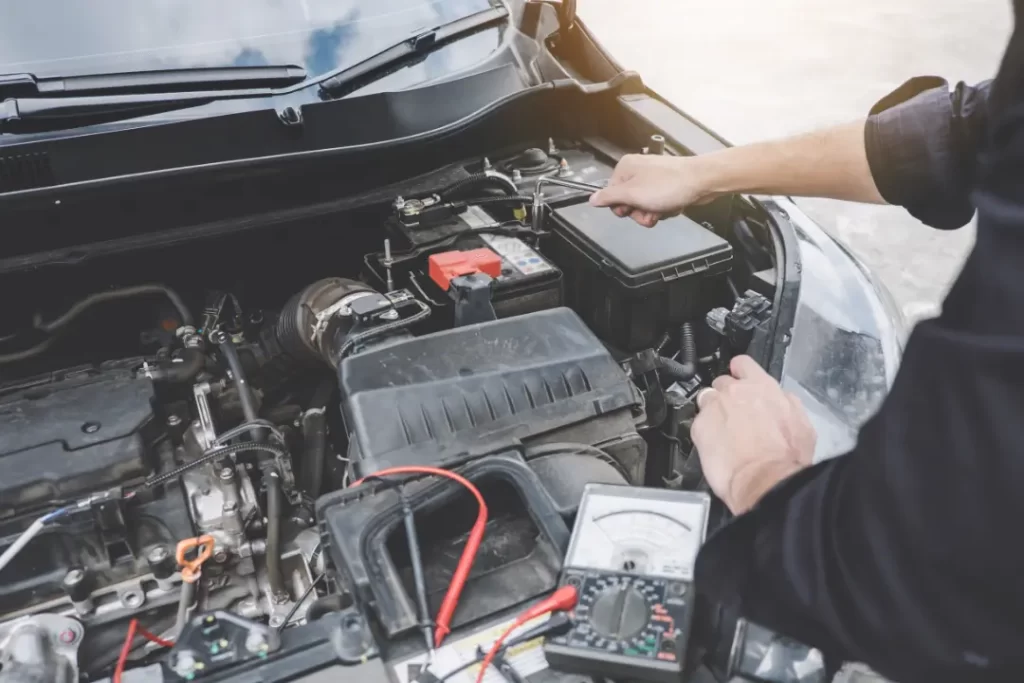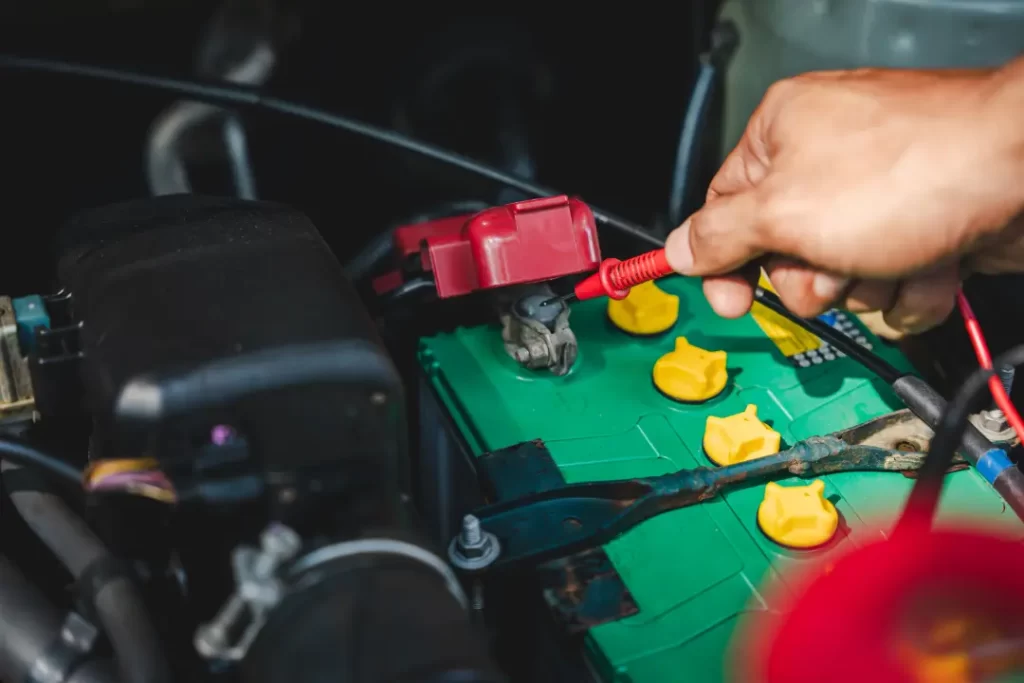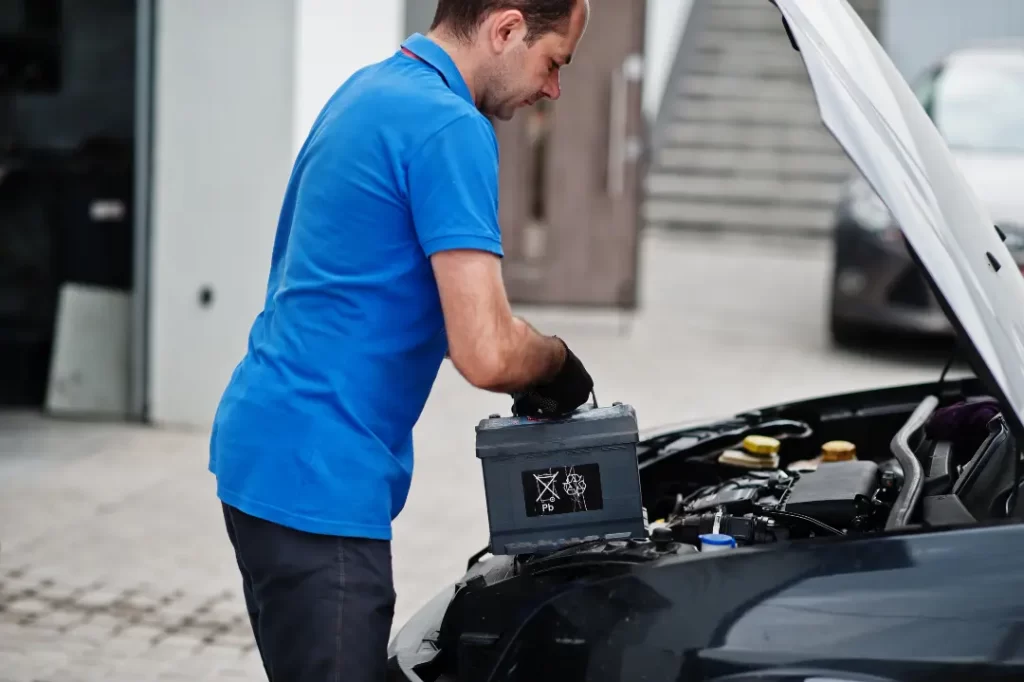Are you stuck with a car that won’t start? Are you wondering, ‘ What car battery do I need?’ This guide will help you quickly choose the correct car battery. We’ll cover how to check your manual, understand battery specs, and more.
Key Takeaways
- You should start by consulting your owner’s manual to find the right car battery specifications, including size and terminal positions.
- Consider key factors like cold cranking amps (CCA) and ampere-hours (AH) to ensure reliable starting and performance for your vehicle’s electrical needs.
- Opt for a reputable brand and consider professional installation for safety and proper handling during the battery replacement process.
Determining the Right Car Battery for Your Vehicle
If your car has been struggling to start or has a battery light on your dashboard, it might be time for a new car battery. Start by consulting your owner’s manual to identify the correct battery for your vehicle. The manual will list the specifications you need, and you can also check the label on your existing battery for details. These specifications include dimensions and terminal positions, which are crucial to ensure the new battery fits securely in your vehicle. You might also wonder, “What battery do I need?” If you’re unsure, consider the condition of your car’s battery.
It’s also worth noting that online tools and battery size checkers can simplify this process. These tools can guide you in selecting the right battery size, ensuring compatibility with your car’s electrical system. These resources help you avoid the frustration of purchasing a battery that doesn’t fit or function properly.

Understanding Battery Group Size
Size matters when it comes to car batteries. The Battery Council International (BCI) group size system categorises batteries by their physical dimensions, terminal types, and voltage requirements. The system simplifies identifying the correct battery for your vehicle. Each BCI Group Size must conform to specific physical dimensions within a 2mm tolerance to ensure a proper vehicle fit.
The significance of BCI group size codes goes beyond just dimensions; they also consider terminal positioning, which is crucial for compatibility with your vehicle’s electrical systems. Ensuring your chosen battery will fit and function correctly within your car’s setup.
Key Factors in Choosing a Car Battery
Choosing a car battery requires more than just selecting the right size. Key factors like cranking amps, cold cranking amps, reserve capacity, and terminal positions all play a crucial role in ensuring your vehicle starts reliably and powers all electrical accessories. A robust battery is crucial, particularly in regions with harsh weather conditions. Understanding how car batteries work is essential for making the right choice.
Using an undersized battery can lead to insufficient power for ignition and vehicle accessories, causing stress on the battery and potentially damaging your car’s electrical system components. Battery types vary in performance, lifespan, and maintenance needs, necessitating careful selection.
Cold Cranking Amps (CCA)
Cold Cranking Amps (CCA) are crucial for any car battery, particularly in cold climates. CCA measures the battery’s ability to start an engine in low temperatures. Starting your engine can become a significant challenge if the CCA rating is below the manufacturer’s recommended minimum.
Think of CCA as a measure of resilience; a higher CCA rating means your battery can handle the strain of cold starts better. This resilience is especially important for vehicles with high-powered accessories like heated seats and sophisticated entertainment systems, which draw more energy from the battery.
Ampere Hours (AH)
Ampere Hours (AH) reflect the amount of energy a battery can deliver over time. A higher AH rating means a longer-lasting power supply for your car accessories. This rating is vital for cars with many electrical accessories, which can quickly deplete a battery with a lower AH rating.
A car battery’s longevity varies by type and is measured by the number of starts it can provide before wearing out. Ensuring you have a battery with an appropriate AH rating can mean the difference between a reliable start every morning and a dead battery at the most inconvenient times.
Types of Car Batteries
Car batteries come in various types, each with its own set of characteristics and benefits. The most common types include:
- Lead-acid
- AGM (Absorbent Glass Mat)
- EFB (Enhanced Flooded Battery)
- Silver Calcium
- Lithium-ion batteries
Each type affects performance, lifespan, and maintenance needs differently, so choose the one that best suits your vehicle and driving habits.
For vehicles with start/stop functionality, opting for AGM or EFB batteries is advisable, as these types are designed to handle the frequent cycling of starting and stopping. Understanding the differences can help you make an informed decision.

Lead Acid Batteries
Lead-acid batteries, including conventional flooded and AGM types, are commonly used in vehicles. SLI (Starting, Lighting, Ignition) batteries are a specific type of lead-acid battery designed for starting vehicles. These batteries typically have an average lifespan of around 20,000 starts, making them a reliable choice for many car owners.
AGM Batteries
AGM batteries are designed to prevent spillage and are suitable for stable power supply applications. They can withstand deeper discharges than traditional lead-acid batteries, making them ideal for vehicles with high electrical demands.
Upgrading from a flooded battery to an AGM battery is generally acceptable, but it’s not recommended to downgrade from an AGM to a standard flooded battery.
EFB Batteries
Enhanced Flooded Batteries (EFB) offer improved performance over standard flooded batteries and are particularly effective in vehicles with frequent stop/start cycles. Using an EFB battery in a stop/start system may quickly render it unusable or damaged.
For vehicles with start/stop functionality, an EFB or AGM battery is the recommended choice to ensure long-term reliability and performance.
How to Use a License Plate Checker Tool
Using a license plate checker tool is a straightforward way to determine the correct battery for your vehicle. Simply enter your vehicle registration number into the tool on the homepage to get a list of compatible batteries. The tool simplifies selection, ensuring you choose a battery that fits and functions correctly.
If no options appear after entering your registration number, seek assistance with your vehicle details to ensure you get the right battery without any guesswork.
Why It’s Important to Choose the Correct Battery
Choosing the correct car battery is crucial for several reasons. A battery that’s too large may not fit the compartment, and if it does, it risks short-circuiting by making contact with other metal parts. Similarly, installing a battery with terminals in the wrong place can prevent cables from reaching the terminals, causing operational issues.
Choosing the wrong battery can lead to quicker replacements and inefficiency in running electronic accessories. Therefore, after receiving battery recommendations, it’s essential to cross-check against the existing battery information to ensure compatibility.
Installing Your New Car Battery
Safety is paramount when installing a new car battery. When disconnecting the old battery, always remove the negative terminal before the positive terminal to prevent accidental short circuits. Cleaning the terminal connectors and battery tray during installation is crucial to prevent corrosion.
When connecting the new battery, attach the positive cable first before the negative cable to ensure a proper connection. Ensure the new battery is securely fastened to avoid movement while driving.
After installation, dispose of the old battery responsibly at a recycling facility. If you’re unsure about any part of the process, having a mechanic handle the installation may be wise, as they have the necessary safety equipment and expertise.
Where to Buy Car Batteries Online
A reliable online retailer simplifies the process of buying car batteries. Euro Car Parts is a trusted retailer offering over 130,000 different car battery part numbers. You can quickly find the right battery for your car by entering your registration number on their website. They also offer convenient services like same-day delivery and click-and-collect within 15 minutes.
Another option is GSF Car Parts, which provides free delivery on orders over £25 within the UK and has 180 store locations for in-person assistance.
The Best Car Battery Brands
When it comes to car battery brands, quality and performance are key. Popular brands include Lion Batteries, Bosch, and Exide. Among these, Lion Batteries is noted as the most popular choice among consumers. Opting for a reputable brand ensures a reliable and long-lasting battery, making it an essential part of your purchase decision.
Benefits of Professional Installation
Opting for professional installation of your car battery offers several benefits. Improper battery connection can lead to dangerous situations, including fire hazards from sparks and the risk of touching metal parts. Professionals can prevent damage to both the battery and your vehicle’s electrical system.
Recycling used car batteries is crucial due to the toxic substances they contain. Professional services ensure safe disposal and compliance with environmental regulations.

Sovereign Motor Engineers: Your Trusted Partner
Sovereign Motor Engineers is a family-run business known for its high-quality car repairs and services. With over 10 years of experience, their team of skilled technicians handles various automotive issues, including car engines, ensuring top-notch results. They offer diagnostics, repairs, MOT testing, and car sales for all makes and models.
Customer satisfaction is a core principle at Sovereign Motor Engineers, leading to a high rate of returning clients. Their commitment to quality service and passion for vehicles is reflected in positive testimonials, with customers praising their honesty, efficiency, and expertise.
Summary
Choosing the right car battery is essential for your vehicle’s reliable operation. This guide has provided comprehensive insights into battery specifications and types, as well as where to buy and how to install them. Selecting the correct battery size, CCA, and AH ratings can significantly impact your car’s performance and longevity.
Don’t hesitate to seek professional help when needed, and consider trusted brands and retailers to ensure quality and reliability. By following these guidelines, you’ll be well-equipped to make an informed decision and keep your vehicle running smoothly.
Frequently Asked Questions
How do I know if my car battery needs replacing?
If your car struggles to start, the battery light is on, or it doesn’t hold a charge, it’s likely time for a replacement. It’s always better to address these issues sooner rather than later!
What is a BCI group size?
A BCI group size refers to the specific classification of batteries based on their physical dimensions, terminal types, and voltage requirements. So, when choosing a battery, matching the BCI group size is essential to ensure it fits your needs perfectly.
What are Cold Cranking Amps (CCA)?
Cold Cranking Amps (CCA) indicate how well a battery can start an engine in cold weather conditions. Essentially, the higher the CCA rating, the better the battery performs in freezing temperatures.
Where can I buy car batteries online?
You can buy car batteries online at Euro Car Parts and GSF Car Parts, both of which provide delivery and collection services. They’re dependable options to consider!
Why should I opt for professional battery installation?
Opting for professional battery installation is smart because it ensures your vehicle’s electrical system stays damage-free and that used batteries are disposed of safely. You’ll have peace of mind knowing it’s done right!

